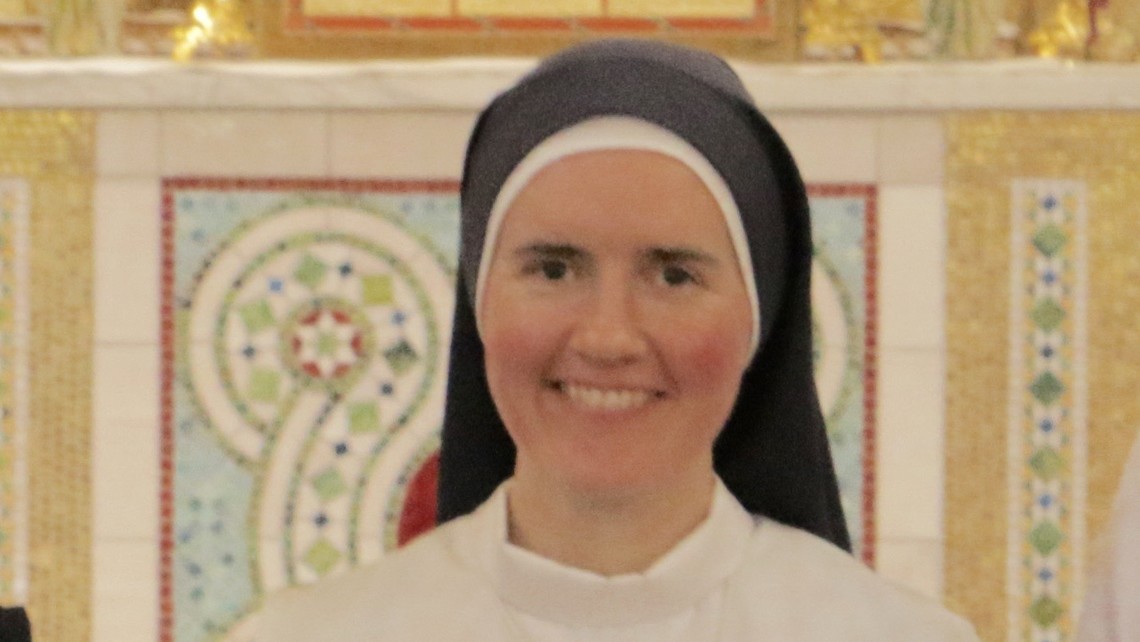
Keeping all these things in our hearts….
By Sister M. Regina
When we come for a Holy Mass in the Extraordinary Form, one of the first things we notice is that the altar looks a different from the way it does when it is prepared for the celebration of the Ordinary Form. There are three frames with text written on them standing on the altar: two smaller ones on the sides and one large one in the middle. These frames are called “altar cards” and they are placed on the altar to help the celebrant with prayers he offers at every Mass when it is inconvenient for him to look at the Missal because he is supposed to be facing a direction other than the missal. So, the cards are there as helps to the priest. The card on the right side, for example, contains the beautiful pray the priest prays while he is at that side of the altar when, after the offertory, he washes his fingers to symbolize the purity required of those who participate in the most Holy Sacrifice of the Mass. As with many of the prayers, the so-called “Lavabo prayer,” printed on the altar card, is taken from the Psalms (Ps. 25:6-12):
I will wash my hands among the innocent: and I will encompass Thy altar, O Lord. That I may hear the voice of Thy praise: and tell of all Thy wondrous works. I have loved, O Lord, the beauty of Thy house and the place where Thy glory dwelleth. Take not away my soul, O God, with the wicked: nor my life with bloody men. In whose hands are iniquities: their right hand is filled with gifts. But as for me I have walked in mine innocence: redeem me, and have mercy on me. My foot hath stood in the direct way; in the churches I will bless Thee, O Lord.
The third sentence of the prayer strikes a deep cord in my soul and I love to pray that line often, thinking of His presence in our tabernacles: “I have loved, O Lord, the beauty of Thy house and the place where Thy glory dwelleth.”
The writing on the altar cards is not in English however, but in Latin. As you will notice when you assist at an Extraordinary Form Mass, almost all the prayers are said in Latin. The absence of English can strike us at first as very strange: many of us do not know Latin and when we suddenly hear many prayers offered in Latin we feel as though we have entered a different world. And that is precisely the point! One of the reasons that the Church continues to use the Latin language is that is reminds us that what happens at the Holy Sacrifice of the Mass is truly “another world”; that it is not our everyday life.
Latin is what may be called a “sacral” language, that is, a language we use in the context of sacred realities. When a person who works in technology speaks, he or she often uses technical language specific to the area of technology, so that someone like me does not understand it well. We have specific languages we use for particular purposes. It is common in religion, not just in Catholicism, to have a sacral language. Jews around the world still use Biblical Hebrew in their synagogue services. Muslims are not even allowed to translate the Koran from the original Arabic. Eastern Orthodox Christians celebrate the Divine Liturgy in Byzantine Greek and Old Slavonic, which differ noticeably from the modern spoken forms of those languages. The Latin language, which at one time was the common language of Rome, came to be the sacral language of the Roman Church’s liturgy. The use of such sacred language reminds us that at Holy Mass we enter into a supernatural reality, transcending our everyday experience.
Bishop Marc Aillet, Bishop of the Diocese of Bayonne in France, explains well that the use of Latin also emphasizes the mystery which is an essential aspect of the Sacred Liturgy. A mystery is a truth we know by revelation which cannot be fully understood by our finite minds. We know the mystery which takes places at the Holy Sacrifice of the Mass: that it is a re-presentation of the Sacrifice of Calvary which brings us redemption, but we cannot fully understand what that means. The use of Latin helps to highlight that, in the Sacred Liturgy, we cannot understand everything rationally and fully, but that this is a reality which transcends our understandings and is a mystery into which we have the privilege of entering with our whole heart and mind. Bishop Aillet writes:
Indeed, Latin has, so to speak, two conjoined effects: it brings the mystery to light, at the same time that it veils its unbearable splendor. It is like an arrow pointing toward the ineffable, which throws it into relief, which brings it to light without staining it; it is also a veil that allows the human mind to perceive it without being stunned, a veil that also makes it possible to avoid touching the precious treasure with bare hands (Sacred Liturgy: The Source and Summit of the Life and Mission of the Church, ed. Alcuin Reid; San Francisco, CA: Ignatius Press, 2014, pp. 172-173.)
Let us thank God for the gift of the Holy Sacrifice of the Mass in which we are privileged to participate so often, even on a daily basis.

